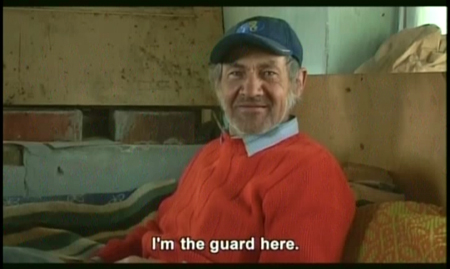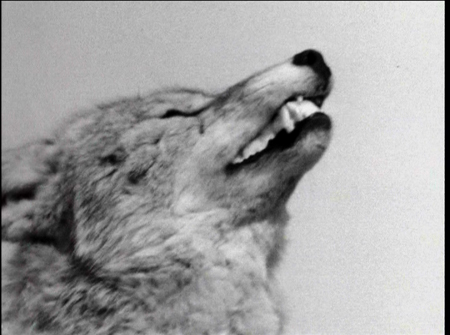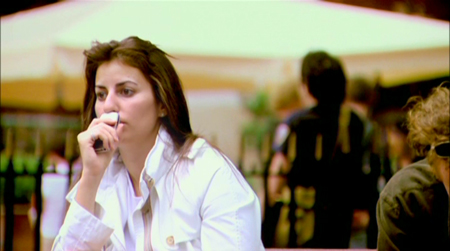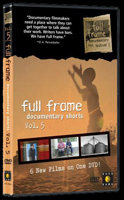BUY IT AT AMAZON: CLICK HERE!
STUDIO: Newvideo
MSRP: $26.95
RATED: NR
RUNNING TIME: 126 Minutes
SPECIAL FEATURES:
• Filmmaker biographies
The Pitch
“Economic
and educational! Learn something new in thirty minutes or less!”
The Humans
Many and
various. The directors are: Erin Hudson, Astrid Bussink, Cindy Stillwell,
Darren Hercher, Peter Jordan, Eva Weber.
The Nutshell
The
annual Full Frame documentary festival has been called the “
and attracts dozens of filmmakers young and old. This disc is a small selection
of films that have played well to audiences in the festivals’ recent history.
The Lowdown
For the
sake of avoiding my futile grasping at contextual connections between the six
shorts, I’m going to consider each independently.
Afloat, by Erin Hudson: This is a simple
five-minute piece centered on a water aerobics class being taught for senior
citizens. In voice-over, interview subjects recount their memories of playing
in the old swimming hole, and how strange it is for other to consider you
practically dead just because of your age. The mood is meditative, and without
self-pity. The thesis is pretty much the title, gently communicated; the film’s
subjects remain Afloat.
The Angelmakers, by Astrid Bussink: On to
something a bit more structured. Bussink’s half-hour folk history covers a
small village in the Hungarian countryside where, in the early 20th century,
over one-hundred-and-twenty murders were committed by some sixty women. Most of
the victims were male; most of those
were husbands to the murderers. Rather than being a purely informational
documentary, with an admittedly fascinating topic, Bussink takes the time to
develop a deeper set of social and sexual politics against the backdrop of a
village which hasn’t changed much at all in eighty years. It’s a wonderfully
human — and occasionally comic — look at the local myth, and how it reflects
the larger stories of the world.

No fair, Chester. You got to be the guard last week.
High Plains Winter, by Cindy Stillwell: The village
in The
Angelmakers was coasting toward its end, but the Western town features
in High
Plains Winter ain’t going out with a whimper. This black-and-white,
dialogue-free piece sets up to watch the denizens of a farming community engaging
in an unusual sport to keep the cold and boredom at bay. Imagine something like
Jackass
meets
saddle of a horse, which is then driven into a gallop by its rider. The skier
flies along behind like a water-skier behind an outboard, aiming himself toward
jumps and slaloms. Stillwell takes careful steps to juxtapose this little
jamboree with the desolation of the season, to an end that sets cognitive dissonance
in the audience’s mind.
Send Me Somewhere
Special, by
Darren Hercher: A near-penniless young man decides to give meaning to his life
by picking a stranger at random and asking that stranger to send him somewhere
special. The fellow he picks sends him traipsing to a tiny village in
of individuals, who gradually open up to him and tell him their stories. Hercher
occasionally plays up the profundity of his exercise, and stretches like a sophomore
essayist for the epiphany, but there’s no denying his project bears an implicit
interest. Hercher submerses himself in other people, and doing so reminds the
audience that humanity is composed of humans, and it’s hard to find a human who
holds no interest in his or her own life, or whose life can hold no interest
for you.

Go on, guess what he’s smiling about.
Stand Like Still
Living, by
Peter Jordan: The AIDS epidemic is beyond control in
him follow them through their testing, as they wait for word on whether or not
they’re HIV-positive, and what happens after. These are two people whose
miseries have been compounded on miseries, and they’re plenty honest about it. By
occasionally turning over the camera to one of the subjects,
about this story. Not exactly the truth of the individual, but the truth of how
he acts when he has an audience, which holds as much insight into character as does
naked vulnerability. This is a touching piece on dignity, which is cast as much
more a tangible quality than an ideal — a possession of all people independent
of the context of environment.
The Intimacy of
Strangers, by
Eva Weber: The last piece on this disc is the most experimental. Weber’s film
is composed of nothing more than the taped conversations of Londoners talking
on their mobile phones. None of the conversationalists are aware that they’re
being taped at the time, and so they hold no pretense over their words. The
conversations are edited together, dealing primarily with relationships, not to
the point of coherency but so that they all follow a similar dramatic rise and
fall. It’s much more successful than I had anticipated, with an ending that
couldn’t have been more perfect if it were scripted.

Crazy Frog, Crunchy Frog, what’s the difference?
The Package
Check out
filmmaker biographies. Check ‘em out for a long time, because that’s all you
get. As with most discs that don’t have much in the way of bonuses (not that
this release really begs for them,) “interactive menus” are listed as a
feature. I’d like to see a DVD that has non-interactive menus. You just stare
at it, and then it picks whatever it wants.
This
fifth volume of Full Frame Documentary Shorts holds some fine examples of
earnest and honest non-fiction filmmaking, and the lone strengths of Stand
Like Still Living and The Angelmakers would make it a disc
worth owning, even were the other films not engaging.
8 out of 10
